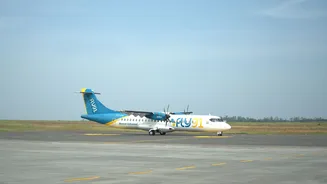Greece: Island Fees
Greece is tackling overtourism head-on by implementing and expanding tourism taxes. Cruise passengers visiting popular islands will face a new disembarkation
fee. Santorini and Mykonos will see an increase to €12 (approximately Rs 1,229), while smaller island ports will charge €3 (approximately Rs 307) during regular months, with potentially higher fees during peak season. This revenue will be directed towards improving waste management and enhancing crowd security measures. These charges aim to protect the infrastructure and natural beauty of these sought-after destinations. With these initiatives, Greece is proactively managing the impact of tourism to ensure a sustainable experience for both visitors and residents. The fees will help to maintain the allure of these islands for the future.
Venice: Entry Fee Returns
Venice is reintroducing a daily visitor entry fee in 2026, with an increased cost for those arriving close to their visit date. The fee, which was previously set at €5 (approximately Rs 512), will now be €10 (approximately Rs 1,024) for reservations made within three days of arrival. This measure will be in effect for 54 high-traffic days between April and July. Visitors must register and obtain a QR code for entry. The purpose of this tax is to manage the flow of tourists and protect the historic city from the negative effects of overtourism, such as environmental damage and overcrowding. By implementing these fees, Venice is striving to preserve its unique character and provide a more pleasant experience for everyone. The tax will help to address issues of congestion and preserve the city's historical sites, ensuring that Venice remains a cherished destination for years to come.
Norway: National Tax
Norway is set to introduce its first national tourist tax in 2026. Municipalities have been authorized to levy up to a 3 percent tax on overnight stays and cruise visits. This tax will be rolled out across popular tourist attractions, including Bergen, Geiranger, and Tromsø, starting as early as the summer of 2026. The primary goal of this tax is to safeguard local infrastructure and alleviate the pressures of overcrowding in fjord towns and Arctic regions. This strategic financial investment shows Norway's commitment to sustainable tourism, working to preserve its natural beauty and ensure that the experiences of visitors do not negatively impact the environment or local communities. With the implementation of this tax, Norway aims to balance tourism with environmental preservation, ensuring that the country's breathtaking landscapes remain intact for generations.
Japan: Tiered Hotel Tax
Japan is preparing to adopt a new tiered hotel tax in Kyoto, starting in March 2026. This tax will be based on the accommodation type, ranging from ¥200 (approximately Rs 114) for budget stays to ¥10,000 (approximately Rs 5,722) per night for luxury hotels. The Japanese government anticipates an annual revenue increase of ¥12.6 billion (approximately Rs 721 crore) through this tiered system. The collected funds will be invested in enhancing transport mobility and improving crowd management. This approach shows Japan’s commitment to providing a balanced, enhanced tourism experience, while also generating revenue to maintain infrastructure. This tax model will provide funds for enhancements, helping Kyoto to better manage its tourism flow. The tax also aims to ensure that the city continues to attract visitors while keeping the infrastructure up-to-date.
Spain: Expanded Tourism Tax
Spain is planning to expand its tourism tax in 2026. Travelers are currently paying an additional €4 (approximately Rs 409) per night for accommodations, but this fee will increase by approximately another hundred rupees in 2026, reaching over Rs 1,000 by 2029. The collected revenue will be directed towards the preservation of heritage sites and environmental projects. This proactive approach underscores Spain's dedication to sustainable tourism and its efforts to manage the impact of visitors on its cultural and environmental resources. By reinvesting the tax revenue, Spain aims to preserve its cultural heritage and protect its stunning landscapes for generations. The initiative will ensure the long-term sustainability of the country’s significant attractions. The funds will focus on heritage preservation and environmental projects.
Thailand: Fee for All
Thailand will begin charging tourists a fee of 300 baht (approximately Rs 818) starting in February 2026. This fee, known locally as ‘Kha Yeap Pan Din,’ will be collected by airlines and border authorities for all arrivals, whether by air, land, or sea. Out of this total, 70 baht (approximately Rs 191) will be allocated for travel insurance coverage, and the remaining amount will support infrastructure upgrades and emergency services. Potential exemptions may apply to work visa holders and frequent visitors. This new tax is intended to support and enhance Thailand's tourism infrastructure. The collected funds will be invested to improve the country’s infrastructure, travel insurance, and emergency services. The measures are expected to benefit tourists by making their visits safer and more comfortable. The government plans to balance tourism with the needs of the country, by ensuring there is adequate support to maintain its infrastructure.













